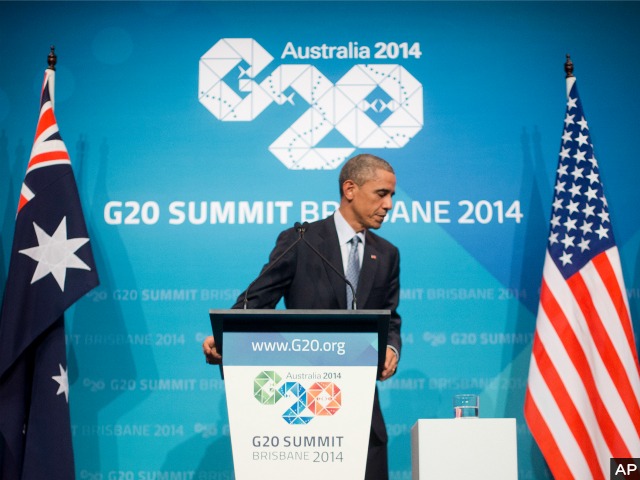There are at least two notable issues that emerge from this brief clip of Barack Obama’s latest remarks on the current fire storm surrounding Jonathan Gruber, ObamaCare and the White House.
First, Obama describes Gruber as “some adviser who never worked on our staff.” While that may be technically correct, it would depend on what the definition of “staff” is. While Gruber didn’t take the pay cut that joining Obama’s staff may have cost him, certainly he was specifically sought out and retained by the administration as a key figure in their efforts to pass the Affordable Care Act.
The other issue raised by Obama’s comments is significant and pertains to Gruber, as well.
In 2009, just one month after President Obama took office, the Department of Health and Human Services put out a sole-source solicitation titled “Technical Assistance in Evaluating Options for Health Reform.” The contract would be with Gruber, who the document said was the only person “reasonably available to satisfy agency requirements.”
As the agency put it, “Dr. Gruber developed a proprietary statistically sophisticated micro-simulation model that has the flexibility to ascertain the distribution of changes in health care spending and public and private sector health care costs due to a large variety of changes in health insurance benefit design, public program eligibility criteria, and tax policy.”
In the exchange with Fox News reporter Ed Henry, Obama encourages “every press outlet here to go back and pull up every clip, every story…” in citing the “transparency” surrounding the ObamaCare debate.
However, one doesn’t have to try very hard to find clips which reveal the lack of transparency around the debate, most especially as it involves the role of the now controversial Jonathan Gruber. He wasn’t even disclosing that he was raking in big bucks from the White House in many of those clips. Consequently, as he was a key source for both the legislation and a major source for the ensuing press coverage, there’s no reason to believe anything in and around the Obamacare debate was truly transparent, as Obama tried to claim.
Perhaps that he was speaking today from down under in Australia explains why he seems to have everything upside down right now.
The first four months of (Gruber’s) contract (with the Obama administration) could not be found on the FedBizOpp.gov Web site, but in June 2009, HHS renewed the contract for eight months, with a value of $297,600. Gruber in an e-mail confirmed that the first part of the contract was for $95,000.
That adds up to $392,600 — or “almost $400,000.”
Gruber’s consulting was largely unknown at the time, and eventually it became an issue as he had been frequently quoted by journalists and lawmakers who may not have known of his connection to the administration; he also generally did not disclose his connection when writing opinion articles.
In one especially fishy circumstance, Nancy-Ann DeParle, at the time director of the White House Office of Health Reform, wrote about Gruber’s work on the White House blog on Nov. 29, 2009. “MIT Economist Confirms Senate Health Reform Bill Reduces Costs and Improves Coverage” was the headline on the post.
DeParle made no reference to the fact that Gruber had already earned hundreds of thousands of dollars working for the administration. She described him as an “MIT economist who has been closely following the health insurance reform process.”
(The emphasis on reducing costs in Gruber’s report is especially interesting in light of the Gruber video that emerged Thursday. “What the American public cares about is costs,” Gruber said in 2010. “And that’s why even though the bill that they made is 90 percent health insurance coverage and 10 percent about cost control, all you ever hear people talk about is cost control.”)
In any case, the passage of the Affordable Care Act in 2010 has been lucrative for Gruber and his microsimulation model. All told, he has been hired by at least eight states to provide advice or assist in creating the health-insurance exchanges that are at the heart of the Affordable Care Act: Colorado, Connecticut, Maine, Michigan, Minnesota, Vermont, West Virginia and Wisconsin.
Not all of the contracts could be found on public Web sites, but here is a sampling. In some cases, Gruber worked with other consultants, so the fees were shared. These figures also might not represent the final payout, and of course these are gross figures, before expenses. But it’s safe to say that about $400,000 appears to be the standard rate for gaining access to the Gruber Microsimulation Model.
Michigan: $481,050
Minnesota: $329,000
Vermont: $400,000
Wisconsin: $400,000
Gruber has also earned more than $2 million over the last seven years for an ongoing contract with HHS to assess choices made by the elderly in Medicare’s prescription-drug plan.

COMMENTS
Please let us know if you're having issues with commenting.